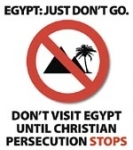20 July 2012
Islamism and insecurity leave Egyptian Red Sea beaches empty
 Seventeen months after the fall of Mubarak, tourist executives lament a 70 per cent drop in the number of visitors. Tourist operators call on President Morsi not to islamise beach resorts. Tourists to Egypt in the first five months of this year were down 26 per cent from 2010 with earnings down 24 per cent.
Seventeen months after the fall of Mubarak, tourist executives lament a 70 per cent drop in the number of visitors. Tourist operators call on President Morsi not to islamise beach resorts. Tourists to Egypt in the first five months of this year were down 26 per cent from 2010 with earnings down 24 per cent.
Cairo (AsiaNews/Agencies) - For more than a year, Red Sea resorts have struggled with near empty beaches, silent hotels, shops and malls as well as idle barmen and waiters. What was once the pearl of Egypt's tourist industry, now is but a shadow of its former self since Mubarak's fall 17 months ago. Tourist executives are pessimistic, and look with fear at the new Egypt under the Muslim Brotherhood. Meanwhile, Egypt's new rulers have not yet said what they would do with alcoholic beverages, bikinis, mixed swimming pools and dance clubs.
"My business has shrunk by at least 70 per cent in the past year," said Waleed, a businessman in Sharm el-Sheik." "Egypt," he explained, "lives on tourism. I think Morsi wants to islamise tourism in the long run, but for the next few years he won't do anything because people need to eat."
In fact, the Brotherhood's 81-page election programme does not mention beach tourism, which brings in the most tourist dollars by far. Officials in the movement have said they have other priorities for now, dismissing the sector as marginal with few jobs. However, the party does promise to encourage alternatives-cultural, ecological and medical tourism, and desert excursions.
Industry professionals disagree. They say beach holidays make up as much as 80 per cent of Egyptian tourism. Before the current drop, the country was a serious rival to countries like Spain and Turkey as a sunny getaway for millions of cost-conscious Europeans.
Some 12 to 15 per cent of Egypt's workforce caters to the needs of foreign visitors, directly or indirectly. Tourism accounts for 11 per cent of gross domestic product and a quarter of foreign exchange earnings, economist Samir Makary said. Most importantly, it has offered jobs to a fast-growing population that stagnating manufacturing was unable to absorb.
As the Arab spring unfolded, tourists began staying away, drastically reducing tourism-related employment.
In the first five months of this year, the number of visitors to Egypt was down 26 per cent from 2010. Earnings dropped by 24 per cent.
For Makary, in addition to the Islamist threat, political instability is another factor affecting tourism. Regular demonstrations and clashes between police and protesters, which have caused 800 deaths, have scared off tourists.
"Travel agents and customers from the West are concerned and nervous about the safety of travel in Egypt," said Mimi Weisband, Crystal Cruises Public Relations Vice President.
With tourist operators looking at the other side of the Red Sea, many warn of the consequences of a radical islamisation of Egypt.
"Saudi Arabia has the best virgin beaches, with soft sands. They have plenty of airports and good roads," one industry executive said. However, "not a single tourist goes" there, "except for the Muslim pilgrimage" to Makkah.
13:53 Posted in Egypt | Permalink | Comments (0) | ![]() Facebook |
Facebook |



















The comments are closed.